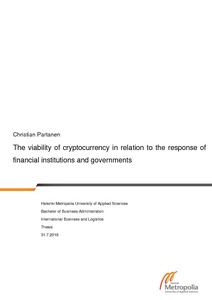The viability of cryptocurrency in relation to the response of financial institutions and governments
Partanen, Christian (2018)
Partanen, Christian
Metropolia Ammattikorkeakoulu
2018

Creative Commons Attribution-NonCommercial-ShareAlike 3.0 Unported
Julkaisun pysyvä osoite on
https://urn.fi/URN:NBN:fi:amk-2018081714555
https://urn.fi/URN:NBN:fi:amk-2018081714555
Tiivistelmä
Cryptocurrencies represent an alternative method of managing todays financial world. Operating in the block chain network, these alternative methods of finance provide disintermediation in a digital world where all users are anonymous. The existence of cryptocurrencies has been a threat to current financial institutions, and governments are trying to figure out how to manage their usability in everyday life.
The author has decided to pursue this topic to answer the question; What is the viability of cryptocurrency in relation to the response of financial institutions and governments? Research into the response of The United States, European Union, Switzerland, China, and South Korea provides sufficient information due to their status as leading regions in investment and daily trading of cryptocurrencies. The basis for answering the question will be supported by expert analysis and economic theory. Data of historical price, value, and other statistics will show the effect that the large stakeholders have had on the cryptocurrency markets.
The analysis provided will utilize the SWOT and PESTLE methodology in order to provide a well-rounded conclusion. The response that governments and financial institutions have made indicate that cryptocurrencies need to be supervised and controlled by authorities due to their nature as an anonymous peer-to-peer network method of making transactions.
What the author concluded from research and analysis is that cryptocurrencies are viable in today as a source of investment when classified as an asset, commodity, or service. They will remain viable if governments have regulated it according to their guidelines. What the response of financial institutions have shown is that cryptocurrencies cannot challenge the current legal tenders and therefore cannot become new standard for currencies. Lastly, the author finds that cryptocurrencies will have to concede central aspects of their core identity such as anonymity to be implemented into legal framework.
The author has decided to pursue this topic to answer the question; What is the viability of cryptocurrency in relation to the response of financial institutions and governments? Research into the response of The United States, European Union, Switzerland, China, and South Korea provides sufficient information due to their status as leading regions in investment and daily trading of cryptocurrencies. The basis for answering the question will be supported by expert analysis and economic theory. Data of historical price, value, and other statistics will show the effect that the large stakeholders have had on the cryptocurrency markets.
The analysis provided will utilize the SWOT and PESTLE methodology in order to provide a well-rounded conclusion. The response that governments and financial institutions have made indicate that cryptocurrencies need to be supervised and controlled by authorities due to their nature as an anonymous peer-to-peer network method of making transactions.
What the author concluded from research and analysis is that cryptocurrencies are viable in today as a source of investment when classified as an asset, commodity, or service. They will remain viable if governments have regulated it according to their guidelines. What the response of financial institutions have shown is that cryptocurrencies cannot challenge the current legal tenders and therefore cannot become new standard for currencies. Lastly, the author finds that cryptocurrencies will have to concede central aspects of their core identity such as anonymity to be implemented into legal framework.
